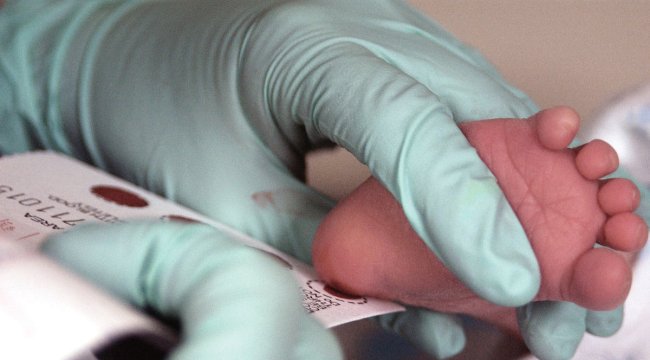Respiratory physician Lutz Beckert considers chronic obstructive pulmonary disease management, including the prevention of COPD, the importance of smoking cessation and pulmonary rehabilitation, and the lifesaving potential of addressing treatable traits. He also discusses the logic of inhaler therapy, moving from single therapy to dual and triple therapy when indicated, as well as other aspects of management
Dispatches - Australia's Voice to Parliament, and more
Dispatches - Australia's Voice to Parliament, and more

Australian Federal health and aged care minister Mark Butler has written supporting the Voice to Parliament, a committee of Aboriginal and Torres Strait Islander people to offer advice on issues that particularly affect them.“I can’t think of a more important area where we should listen to that advice than health,” writes Mr Butler in a column for the Royal Australian College of GPs. The Australian Medical Association and RACGP are backing the Voice, which is the subject of a referendum on 14 October.
One in three adults worldwide – about 1.3 billion people – have high blood pressure, reports WHO, saying this “silent killer” puts people at risk of heart attack, disabling strokes and premature death. “Approximately four out of every five people with hypertension are not adequately treated, but if countries can scale up coverage, 76 million deaths could be averted between 2023 and 2050,” according to a media release from WHO.
COVID-19 cases have been climbing in England, where 11,668 people had a positive test result on 9 September, up 28.5 per cent on a week earlier, while the 3287 new COVID admissions to hospital were an increase of 29.9 per cent. The Welsh Government says the “potentially concerning” increase in COVID-19 case rates and hospital admissions in Wales, England and Scotland may be driven by changes to COVID variants, including BA.2.86.
Kerala state in India is battling an outbreak of the bat-borne virus Nipah. WHO lists Nipah as a priority pathogen – with high epidemic potential, but with few or no countermeasures. WHO also noted the Netherlands has had its first human infection with A(H1N1)v virus (swine flu) this year.
Waitākere Hospital in west Auckland is to get a new primary birthing unit with the Government providing $12.3 million, health minister Ayesha Verrall says in a media release. The facility, with six birthing or postnatal suites, whānau room, education room, staff areas and gardens, will allow the hospital to cope with 500 additional births a year. The unit will be home to Auckland’s first community breast milk bank.
The Government has announced revised plans for a bigger pathology laboratory as part of the new $1.5 billion Dunedin Hospital project. A review found the lab area in the hospital plans was not going to be big enough, says Dr Verrall in a statement. There is still a lot of work to be done on the expanded pathology lab proposal, Dr Verrall says. Te Whatu Ora will work with local clinicians and its pathology provider on where the laboratory will be located.
Spinal muscular atrophy will be added to the Newborn Metabolic Screening Programme next year, in a bid to detect the genetic disorder in infants as early as possible. Te Whatu Ora, in a media release, says four to six babies are diagnosed each year with the disorder, which eventually causes multiple impairments. Pharmac has recently begun funding treatments for the condition.
The Pasifika Medical Association and Te Marae Ora Cook Islands Ministry of Health signed a memorandum of understanding, symbolising commitment to addressing community priorities, extending beyond the healthcare sector, says a media release from the association. Commitments include support for developing Cook Islands’ primary care, and patient referral systems for Cook Island patients in New Zealand.
Two-thirds of female surgeons in the UK say they have been sexually harassed and one-third sexually assaulted by colleagues in the past five years, says a survey in the BJS (online, 12 September). One senior surgeon says when she was a trainee in the operating theatre, a surgeon buried his head in her breasts. “You just freeze, right, ‘why is his face in my cleavage?’,” she says. The UK’s Working Party on Sexual Misconduct in Surgery proposes a framework of zero tolerance for sexual misconduct in healthcare and robust mechanisms to deal with perpetrators. (For more on the challenges facing women in medicine, see Lucy O’Hagan’s column on page 35).
NHS England says it will develop a course on myalgic encephalomyelitis/chronic fatigue syndrome (ME/CFS) to counter “dismissive attitudes” among health professionals. Better training and education on ME/CFS is aimed at improving NHS care for patients, who are often not “believed, supported or treated equally”, says the NHS, adding misconceptions about the condition persist.
The nurses’ union NZNO says at least 4000 nurses are needed “tomorrow”, and any recruitment initiatives must focus on Māori and Pasifika nurses, midwives and health care assistants. Increasing their numbers significantly will result in care that is culturally appropriate, leading to increased (and earlier) Māori and Pasifika engagement with services and significantly reducing the economic burden, the union says.
The Canterbury Cancer Centre in Christchurch, built with $6.5 million from the Government’s infrastructure scheme for shovel-ready projects allocated in 2020, has been officially opened. The centre offers 50 rooms for South Island patients and families, and space for cancer services to co-locate and collaborate.
WHO and the World Bank are pointing to “an alarming stagnation” in progress towards universal, quality, affordable and accessible healthcare. In their 2023 Universal Health Coverage Global Monitoring Report, they say more than half of the world’s population is not covered by essential health services. Two billion people face severe financial hardship when paying for health services and products. WHO director-general Tedros Adhanom Ghebreyesus says in a media release: “We urgently need stronger political will, more aggressive investments in health, and a decisive shift to transform health systems based on primary health care.”
French regulator Agence nationale des fréquences says it told Apple to withdraw the iPhone 12, saying testing showed its specific absorption rate for radiofrequency energy (electromagnetic radiation) exceeds EU standards. The agency ordered Apple to remedy products or face a recall and said it would be checking the phone is no longer being offered for sale in France. Apple rejects the allegation of excessive radiation, reports Reuters.






![Barbara Fountain, editor of New Zealand Doctor Rata Aotearoa, and Paul Hutchison, GP and senior medical clinician at Tāmaki Health [Image: Simon Maude]](/sites/default/files/styles/thumbnail_cropped_100/public/2025-03/Barbara%20Fountain%2C%20editor%20of%20New%20Zealand%20Doctor%20Rata%20Aotearoa%2C%20and%20Paul%20Hutchison%2C%20GP%20and%20senior%20medical%20clinician%20at%20T%C4%81maki%20Health%20CR%20Simon%20Maude.jpg?itok=-HbQ1EYA)
![Lori Peters, NP and advanced health improvement practitioner at Mahitahi Hauora, and Jasper Nacilla, NP at The Terrace Medical Centre in Wellington [Image: Simon Maude]](/sites/default/files/styles/thumbnail_cropped_100/public/2025-03/2.%20Lori%20Peters%2C%20NP%20and%20advanced%20HIP%20at%20Mahitahi%20Hauora%2C%20and%20Jasper%20Nacilla%2C%20NP%20at%20The%20Terrace%20Medical%20Centre%20in%20Wellington%20CR%20Simon%20Maude.jpg?itok=sUfbsSF1)
![Ministry of Social Development health and disability coordinator Liz Williams, regional health advisors Mary Mojel and Larah Takarangi, and health and disability coordinators Rebecca Staunton and Myint Than Htut [Image: Simon Maude]](/sites/default/files/styles/thumbnail_cropped_100/public/2025-03/3.%20Ministry%20of%20Social%20Development%27s%20Liz%20Williams%2C%20Mary%20Mojel%2C%20Larah%20Takarangi%2C%20Rebecca%20Staunton%20and%20Myint%20Than%20Htut%20CR%20Simon%20Maude.jpg?itok=9ceOujzC)
![Locum GP Helen Fisher, with Te Kuiti Medical Centre NP Bridget Woodney [Image: Simon Maude]](/sites/default/files/styles/thumbnail_cropped_100/public/2025-03/4.%20Locum%20GP%20Helen%20Fisher%2C%20with%20Te%20Kuiti%20Medical%20Centre%20NP%20Bridget%20Woodney%20CR%20Simon%20Maude.jpg?itok=TJeODetm)
![Ruby Faulkner, GPEP2, with David Small, GPEP3 from The Doctors Greenmeadows in Napier [Image: Simon Maude]](/sites/default/files/styles/thumbnail_cropped_100/public/2025-03/5.%20Ruby%20Faulkner%2C%20GPEP2%2C%20with%20David%20Small%2C%20GPEP3%20from%20The%20Doctors%20Greenmeadows%20in%20Napier%20CR%20Simon%20Maude.jpg?itok=B0u4wsIs)
![Rochelle Langton and Libby Thomas, marketing advisors at the Medical Protection Society [Image: Simon Maude]](/sites/default/files/styles/thumbnail_cropped_100/public/2025-03/6.%20Rochelle%20Langton%20and%20Libby%20Thomas%2C%20marketing%20advisors%20at%20the%20Medical%20Protection%20Society%20CR%20Simon%20Maude.jpg?itok=r52_Cf74)
![Specialist GP Lucy Gibberd, medical advisor at MPS, and Zara Bolam, urgent-care specialist at The Nest Health Centre in Inglewood [Image: Simon Maude]](/sites/default/files/styles/thumbnail_cropped_100/public/2025-03/7.%20Specialist%20GP%20Lucy%20Gibberd%2C%20medical%20advisor%20at%20MPS%2C%20and%20Zara%20Bolam%2C%20urgent-care%20specialist%20at%20The%20Nest%20Health%20Centre%20in%20Inglewood%20CR%20Simon%20Maude.jpg?itok=z8eVoBU3)
![Olivia Blackmore and Trudee Sharp, NPs at Gore Health Centre, and Gaylene Hastie, NP at Queenstown Medical Centre [Image: Simon Maude]](/sites/default/files/styles/thumbnail_cropped_100/public/2025-03/8.%20Olivia%20Blackmore%20and%20Trudee%20Sharp%2C%20NPs%20at%20Gore%20Health%20Centre%2C%20and%20Gaylene%20Hastie%2C%20NP%20at%20Queenstown%20Medical%20Centre%20CR%20Simon%20Maude.jpg?itok=Z6u9d0XH)
![Mary Toloa, specialist GP at Porirua and Union Community Health Service in Wellington, Mara Coler, clinical pharmacist at Tū Ora Compass Health, and Bhavna Mistry, specialist GP at Porirua and Union Community Health Service [Image: Simon Maude]](/sites/default/files/styles/thumbnail_cropped_100/public/2025-03/9.%20Mary%20Toloa%2C%20Porirua%20and%20Union%20Community%20Health%20Service%20in%20Wellington%2C%20Mara%20Coler%2C%20T%C5%AB%20Ora%20Compass%20Health%2C%20and%20Bhavna%20Mistry%2C%20PUCHS%20CR%20Simon%20Maude.jpg?itok=kpChr0cc)